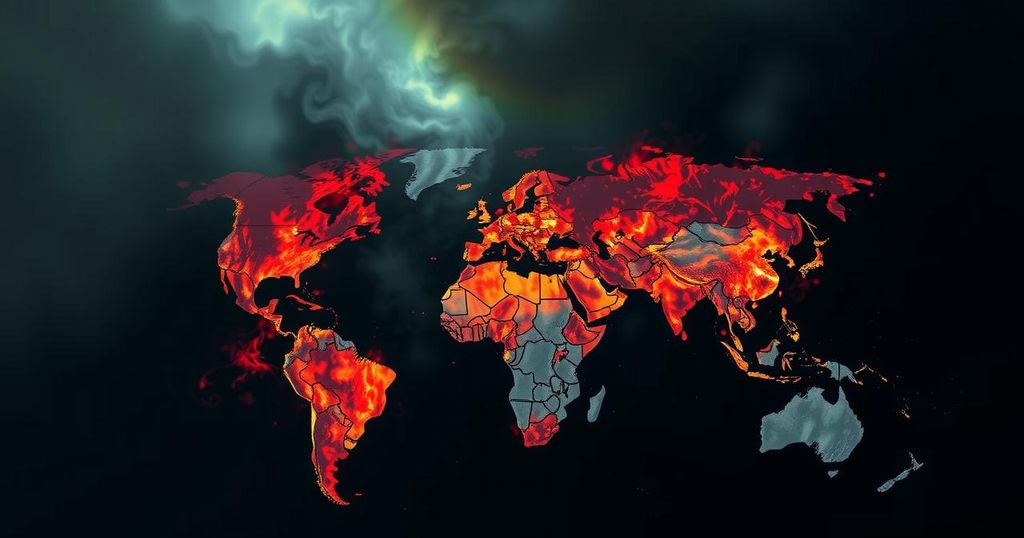Examining the Hypocrisy of Western Criticism of Azerbaijan Amidst Climate Change Initiatives
Azerbaijan’s leadership in the upcoming COP29 conference faces challenges due to a wider anti-Azerbaijani campaign that criticizes the country for its hydrocarbon production, despite its minimal contribution to global emissions. This critique highlights hypocrisy among Western nations, which are responsible for a larger share of global pollution while simultaneously seeking closer gas supply agreements with Azerbaijan. The country is also implementing green transition policies and investing in renewable energy projects. Allegations concerning human rights issues in Azerbaijan distract from the pressing climate crisis, and withdrawal from COP29 could exacerbate global inequalities in climate funding responsibilities.
The current global discourse surrounding climate change is being overshadowed by a concerted anti-Azerbaijani campaign that seeks to thwart the participation of key representatives from the Western world at the upcoming COP29 Conference in Baku. A prominent contention being raised is Azerbaijan’s status as a hydrocarbon-producing nation, which purportedly disqualifies it from assuming a leadership role in climate discussions. This assertion is fundamentally hypocritical, as Azerbaijan contributes a mere 0.1% to global greenhouse gas emissions, contrasting sharply with the European Union and the United States, which together account for approximately 20% of global pollution. If the EU and the United States genuinely prioritize environmental concerns, their concurrent agreement with Azerbaijan to enhance gas supplies raises significant questions regarding their motivations. Natural gas is notably less harmful to the environment than other fossil fuels; its absence would compel European countries to rely more heavily on coal, an energy source recognized for its detrimental environmental impact. Moreover, Azerbaijan is proactively pursuing a green transition. President Ilham Aliyev emphasized at the preliminary UN Climate Change Conference that revenues from oil and gas production are being redirected into green energy initiatives, illustrating that wealth derived from fossil fuels does not preclude substantial contributions to the green agenda. In addition to environmental criticism, Azerbaijan faces unfounded allegations of human rights violations and ethnic cleansing, with discussions in the European Parliament reflecting a dramatic tone rather than substantive concerns. Such accusations were highlighted by MEP Xavier Bellamy, who condemned alleged actions in Nagorno-Karabakh and called for sanctions against Azerbaijani officials, as well as Nathalie Loiseau, who advocated for a boycott of COP29. As the world grapples with the escalating impacts of climate change, it is disheartening to see European lawmakers fixated on geopolitical conflicts rather than addressing the pressing environmental challenges. This raises the question of whether the reluctance of some Western politicians to attend COP29 stems from a desire to avoid financial obligations related to climate funding, particularly in light of the anticipated negotiations aimed at increasing climate financing significantly. Such reluctance could further exacerbate inequalities, particularly for developing nations and those most vulnerable to climate effects, like African countries and small island states. The ramifications of withdrawing from COP29 would be profound, as it could exacerbate strained communications between the Global South and the West, potentially leading to ecological crises worldwide. Therefore, the most effective course of action for Western nations would be to rise above the sensationalism instigated by certain factions and commit to meaningful engagement at COP29 in Baku. Such participation would not only reflect a sincere dedication to global climate efforts but also reinforce the accountability necessary for the future of our shared planet.
The context surrounding this analysis portrays Azerbaijan as a key player in the global discourse on climate change, particularly in light of its role as an oil and gas producer. The article critiques the double standards of Western nations, which contain significant emissions yet seek to condemn other countries based on their hydrocarbon production. It also underscores Azerbaijan’s commitment to investing in renewable energy as part of a green policy initiative. The discussion further touches upon the geopolitical tensions in the region and their influence on environmental discussions, particularly concerning the upcoming COP29 conference.
In conclusion, the critiques aimed at Azerbaijan regarding climate issues are fundamentally flawed and hypocritical, especially in light of its minimal contributions to global greenhouse gas emissions. The ongoing campaign against Azerbaijan appears less about genuine environmental concerns and more about circumventing financial responsibilities linked to climate change. Western nations must prioritize authentic engagement and cooperation at COP29 to demonstrate a commitment to addressing the urgent climate crisis while navigating complex geopolitical landscapes.
Original Source: aze.media




Post Comment